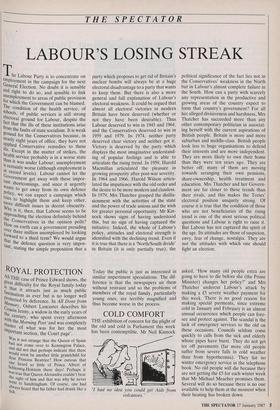THE SPECTATOR
LABOUR'S LOSING STREAK
The Labour Party is to concentrate on employment in the campaign for the next General Election. No doubt it is sensible and right to do so, and sensible to link unemployment to areas of public provision for which the Government can be blamed. The condition of the health service, of schools, of public services is still strong electoral ground for Labour, despite the fact that the ills of these institutions arise from the faults of state socialism. It is weak ground for the Conservatives because, in nearly eight years of office, they have not a. Pplied Conservative remedies to these Ills. Except in the matter of strikes, the health service probably is in a worse state than it was under Labour; unemployment is certainly worse (although employment is at record levels). Labour cannot let the Government get away with these impor- tant shortcomings, and since it urgently Wants to get away from its own defence Policy, we can expect a campaign which tries to highlight them and keep other, more difficult issues in decent obscurity. Why is it, then, that Labour seems to be aPproaching the election definitely behind the Conservatives in the opinion polls? "ow on earth can a government presiding forward three million unemployed be looking mrward to a third term? We would argue that the defence question is very impor- tant, stating the simple proposition that a party which proposes to get rid of Britain's nuclear bombs will always be at a huge electoral disadvantage to a party that wants to keep them. But there is also a more general and full explanation of Labour's electoral weakness. It could be argued that almost all electoral victories in modern Britain have been deserved (whether or not they have been desirable). Thus Labour deserved to win in 1945 and 1964, and the Conservatives deserved to win in 1959 and 1979. In 1974, neither party deserved clear victory and neither got it. Victory is deserved by the party which displays the most imaginative understand- ing of popular feelings and is able to articulate the rising trend. In 1959, Harold Macmillan articulated the pleasure in growing prosperity after post-war severity. In 1964 and 1966, Harold Wilson articu- lated the impatience with the old order and the desire to be more modern and classless. In 1979, Mrs Thatcher grasped the disillu- sionment with the activities of the state and the power of trade unions and the wish for greater personal opportunity. Mr Kin- nock shows signs of having understood this, but no sign of having captured the initiative. Indeed, the whole of Labour's policy, attitudes and electoral strength is identified with the declining trend. Even if it is true that there is a `North/South divide' in Britain (it is only partially true), the political significance of the fact lies not in the Conservatives' weakness in the North but in Labour's almost complete failure in the South. How can a party with scarcely any representation in the productive and growing areas of the country expect to form that country's government? For all her alleged divisiveness and harshness, Mrs Thatcher has succeeded more than any other contemporary politician in associat- ing herself with the current aspirations of British people. Britain is more and more suburban and middle-class. British people look less to huge organisations to defend their interests and are more independent. They are more likely to own their home than they were ten years ago. They are better off; many of them are moving towards arranging their own pensions, share-ownership, health treatment and education. Mrs Thatcher and her Govern- ment are far closer to these trends than their rivals, and this makes the Tories' electoral position uniquely strong. Of course it is true that the condition of those who are not beneficiaries of the rising trend is one of the most serious political questions and Labour is right to raise it. But Labour has not captured the spirit of the age. Its attitudes are those of suspicion, envy, fear of change, nostalgia. They are not the attitudes with which one should fight an election.










































 Previous page
Previous page